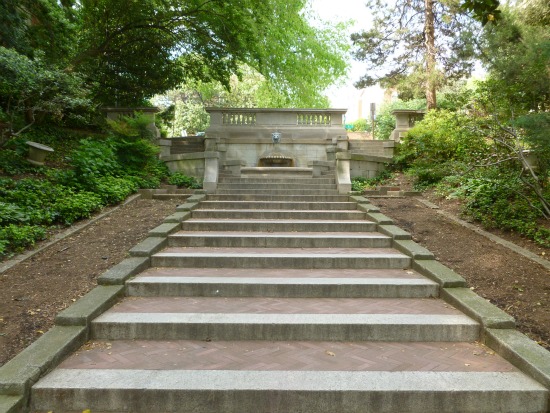What's Hot: Cash Remained King In DC Housing Market In 2025 | 220-Unit Affordable Development Planned Near Shaw Metro
 Kalorama: A Posh View From Embassy Row
Kalorama: A Posh View From Embassy Row
✉️ Want to forward this article? Click here.
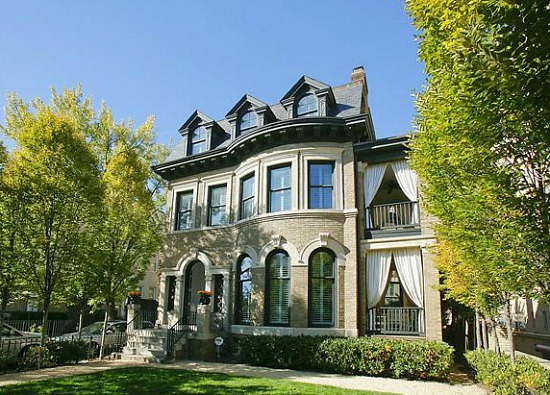
UrbanTurf spends a lot of time thinking and writing about emerging neighborhoods, new architecture and rapidly shifting street scenes. But sometimes taking a look at a neighborhood that is "finished" can be instructive. The small neighborhood of Kalorama emerged during a period of rapid development in DC's history, and the architecture is a kind of time capsule that tells a story of upper-middle class tastes. But while the area now teems with some of the city's wealthier families, the population is not quite as exclusive as it once was.
The History of A Beautiful View
A long time ago, Kalorama was a rural area outside of DC's boundaries. In the 1700's, English settler Anthony Holmead took possession of the land that now makes up the neighborhood, and when he passed away, his nephew built a three-story brick home (at 23rd and S Street NW) on the property. After changing hands a few more times, the land was purchased by poet Joel Barlow in 1808. He was the one who coined the name, deciding that Kalorama (Greek for "a beautiful view") suited the area, which looked down on DC. While various owners made landscaping improvements over time, the area remained home to just the single-family residence for years.
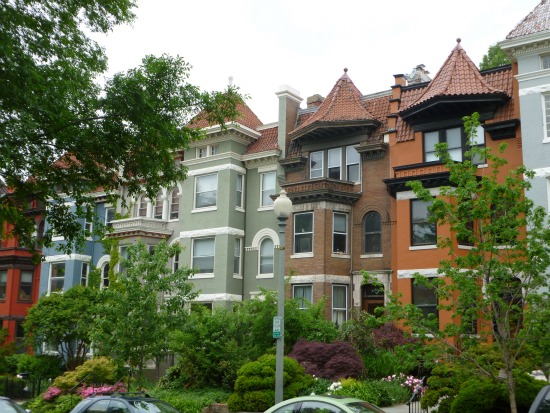
Rowhouses on Biltmore Street
In the 1880's, changes in DC set the stage for a more familiar Kalorama to emerge. The city was growing and developers were looking to expand its boundaries (then marked by Boundary Road, now Florida Avenue). DC's transportation map was also changing; Connecticut Avenue was being straightened and extended and the streetcars were imminent.
Soon, Kalorama was divided in two by Connecticut Avenue -- Sheridan-Kalorama to the west and Kalorama Triangle to the east -- and the plot was cut up into different parcels. Real estate developers touted the area for its beautiful view and comfortable suburban lifestyle, boasting a summer temperature at least 5 degrees lower than in the city, according to documents from the National Register of Historic Places. In 1897, streetcars began to serve the area and people started moving there in droves.
Upper middle-class residents bought up the land and spared no expense in constructing their dream homes. "People would hire America's best and brightest architects of the time to build their house," Jim Bell, a long-time resident and Kalorama real estate agent, told UrbanTurf. "It was a real place to showcase housing design." By 1931, Kalorama Triangle was completely developed.
Grand Homes and Embassies
Generally, Sheridan-Kalorama is full of single-family homes that average about 4,000 square feet in size and sit on large plots of land, while Kalorama Triangle has row houses and apartment buildings, some of which have converted to condos or co-ops.
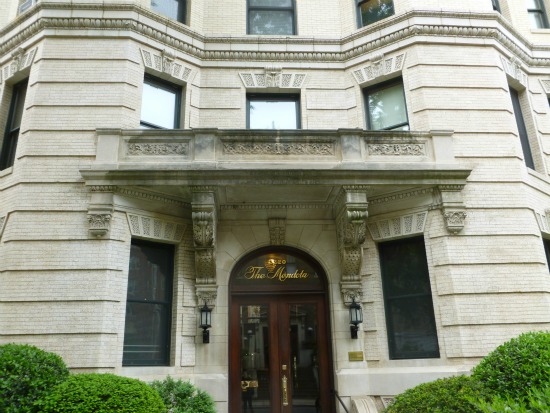
The Mendota, Kalorama's first apartment building.
"The average townhouse that still needs some work sells for about $1.8 million," Bell said. "A finished townhouse sells for between $2.4 million and $2.6 million." Current listings show detached homes with asking prices between $2 and $8 million and condos/co-ops averaging around $500,000. Style-wise, amongst the detached homes there are Arts and Crafts mixed in with the ornate Beaux Arts and evocative Mediterranean (Italian and Spanish) Revivals with stucco and tiled roofs. Tall row houses line up on 19th Street, Biltmore Street, Mintwood Place, and Kalorama Road. Columbia Road is lined with multi-family buildings and The Mendota at 2200 20th Street NW was the neighborhood's first apartment building, built in 1901. Over 20 multi-family buildings went up over the next 26 years.
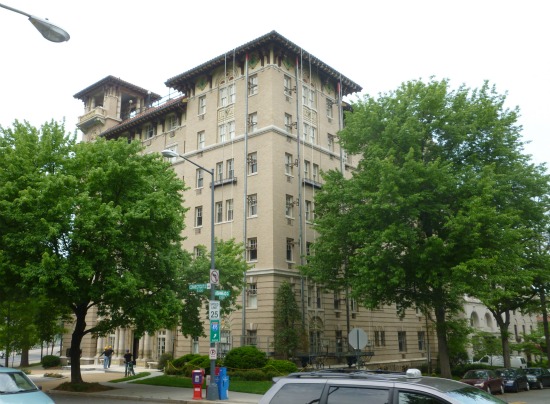
Multi-family building at the corner of Connecticut Avenue and Kalorama Road.
For a few decades, Kalorama residents enjoyed life with their beautiful views; then, in 1929, the Great Depression hit. That event would turn out to have a huge impact on shaping the Kalorama that we know today. When wealthy residents lost all their money, the government bought up many of their beautiful homes. It turned the properties into government residences and embassies, creating a section of what is now Embassy Row.
Kids Join The Neighborhood
These days, Kalorama is full of diplomats, prominent DC professionals and, increasingly, strollers and training wheels. Betty Alvarez moved into a two-bedroom condo on Kalorama Road two years ago with her husband. "We are raising a child here and I've met so many other parents--it's been great," she told UrbanTurf. For Alvarez and her family, Kalorama offered proximity to restaurants and the Metro while giving them peace and quiet. "We were able to go carless when we moved to the area--it was a major selling point," she said. "Yet, I walk around and feel like it could be the suburbs with all the dogs, parks, and expensive strollers. And Rock Creek Park is my backyard." While many of the residents have been there for a long time, Bell told us that there has been a huge increase in children over the past five years. School-wise, Kalorama is zoned for Oyster-Adams, a highly-rated bilingual elementary school in nearby Woodley Park.
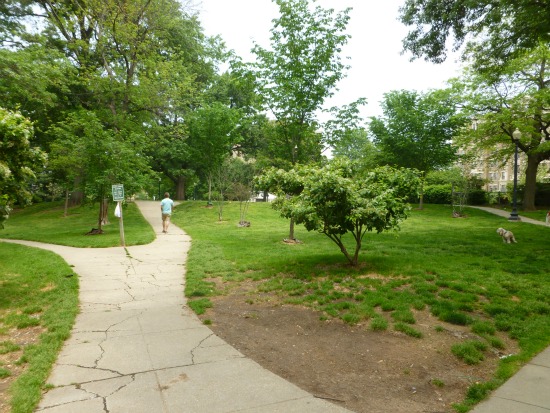
Kalorama Park
Kalorama Park and So's Your Mom
Many neighborhood parents run into each other at Kalorama Park, a well-maintained park with a grassy space, children's area and community garden between 19th Street, Mintwood Place and Columbia Road. On a recent trip, UrbanTurf saw a mom and her son biking around as a resident ate a sandwich from So's Your Mom on one of the many benches.
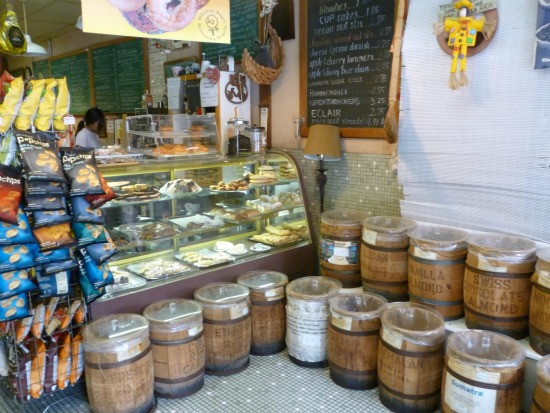
Inside So's Your Mom Deli
So's Your Mom is one of a few retail options on the stretch of Columbia Road between 18th and 19th Streets that straddles Adams Morgan and Kalorama. Despite the irreverent name, the market and deli is wholesome and family-owned. They have a reputation for using and selling high-quality ingredients and their tasty and diverse sandwich menu has a loyal following. Surrounding the market are Fleet Feet, Yes! Organic Market and several restaurants: Perry's, Napolean Bistro, Cashion's Eat Place and the brand new Mintwood Place. Of course, with Adams Morgan just to the east and Dupont Circle to the south, there are plenty of other options nearby. Bob Hirsh has lived in Kalorama for eight years and enjoys the diversity, both culinary and demographic. "The neighborhood has food from all over the world - American, Brazilian, Asian, French, Mexican, and Indian -- and a diverse population -- young and old and all different nationalities."
The Bottom Line
Kalorama is a posh neighborhood full of historically interesting architecture, diplomats and more and more young families. In such close proximity to Dupont Circle, U Street and Adams Morgan, it's amusing to think that the area was once considered rural. For those with means, life in Kalorama means suburban-feeling quiet, urban amenities and most likely, living in a beautiful home.
- Zip Code: 20008 and 20009
- Kalorama real estate data from Redfin
The following real estate agents are active in Kalorama. Call or email them to get in touch.
Phone: 202.669.7406Real Estate Agents Serving Kalorama
Maxwell Rabin
TTR Sotheby's Int'l Realty
Website: View website
Listings: View listings
See other articles related to: dclofts, hoods, kalorama, neighborhood profile
This article originally published at http://dc.urbanturf.production.logicbrush.com/articles/blog/kalorama_a_posh_view_from_embassy_row/5497.
Most Popular... This Week • Last 30 Days • Ever

Today, UrbanTurf is taking a look at the tax benefits associated with buying a home t... read »

Lincoln-Westmoreland Housing is moving forward with plans to replace an aging Shaw af... read »

The small handful of projects in the pipeline are either moving full steam ahead, get... read »
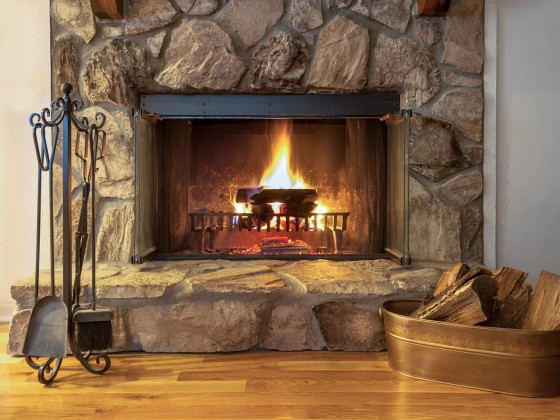
A potential innovation district in Arlington; an LA coffee chain to DC; and the end o... read »

A soccer stadium in Baltimore; the 101 on smart home cameras; and the epic fail of th... read »
DC Real Estate Guides
Short guides to navigating the DC-area real estate market
We've collected all our helpful guides for buying, selling and renting in and around Washington, DC in one place. Start browsing below!
First-Timer Primers
Intro guides for first-time home buyers
Unique Spaces
Awesome and unusual real estate from across the DC Metro
